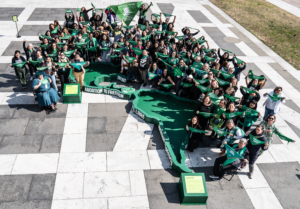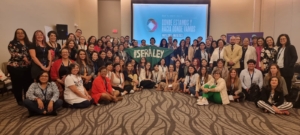Between Tuesday, September 5 and Thursday, September 7, the 8th Open Government Global Summit (OGP Global Summit) was held in Tallinn, Estonia. It brought together members of the Open Government Global Partnership (OGP) from both governments and civil society from around the world, who are working on this agenda in their countries and localities. In this edition, the Summit focused on open government in the digital age, the potential of technology to make governance and policymaking more transparent and accountable, as well as the preservation of democracy.
“Below, we offer a google translate version of the original article in Spanish. This translation may not be accurate but serves as a general presentation of the article. For more accurate information, please switch to the Spanish version of the website. In addition, feel free to directly contact in English the person mentioned at the bottom of this article with regards to this topic”.
At Fundeps we are part of the Network of Civil Society Organizations for the Open State, which accompanies Argentina’s accession to the Alliance for Open Government. We also contribute to the creation processes of both the National Open Government Plans, as well as that of the province of Córdoba and the Legislature of Córdoba.
Based on this, within the 2023 Global Summit, we participated in the Session “Building national-local coalitions for open government” and shared a panel with different government and civil society references from Brazil, Morocco, Ukraine and the Philippines. Experiences of coalitions between federal or national governments with local or municipal labor governments or civil society were shared. In our case, we share the Federal Open Government Program (PFGA) which was the result of a construction between the National Directorate of Open Government, the Municipal Training Directorate and different civil society organizations that collaborate in its design and monitoring in the 4th and 5th National Open Government Action Plan. The PFGA consists of accompanying different initiatives of transparency, innovation, accountability, participation and collaboration promoted by provincial and municipal governments of our country.
Then we attended other talks, workshops and conferences related to experiences of participation and fiscal transparency; transparency in the extractive sector; climate change and just transition; among other. Without a doubt, the OGP 2023 Summit was a very enriching space to share and exchange experiences and realities among the entire open government community. Although the challenges in this agenda remain and are renewed.
At Fundeps we are committed to continuing to collaborate in strengthening initiatives that tend to generate increasingly transparent and permeable governments, with genuine spaces for participation and that respond to social demands in a collaborative way.
Known:
- All the Sessions that took place at the Summit: here.
- The initiatives awarded at the Summit: here.
- The National Open Government Plan: here.
- The Local OGP Plan of the province of Córdoba: here.
- The Open Parliament Plan of the Legislature of Córdoba: here.
Contact
Victoria Sibilla: ninasibilla@fundeps.org


